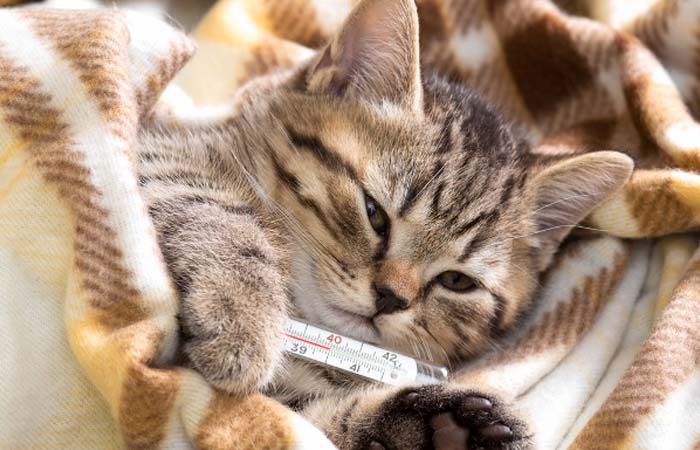Sick cats are difficult to detect because they are very good at hiding their “unsettledness”. They may not show signs of fatigue, illness, but they can still get sick, nervous stress then leads to illness. So how to detect signs of sick cats and how to treat them? The following article will help you to solve this problem.

Sign 1: Cat peeing erratically
Cats peeing around makes it difficult for us to clean up and annoyed by their smell. However, you still need to pay attention because this is also a fairly common sign that your cat is sick. It can be related to health conditions such as:
- Urinary tract infection.
- Kidney disease.
- Diabetes.
- Old cat with arthritis.
Anxiety and stress also cause cats to urinate outside the sandpot as a way of reassurance, because the smell of the cat's own urine makes it feel safe.
Sign 2: Cats have digestive diseases
Signs of gastrointestinal disease in cats:
- Pasta stool.
- The stool is too dry.
- Difficult or painful to clean.
- Bloody stools.
Gastrointestinal diseases in cats include:
Cats with acute gastroenteritis: The gastrointestinal tract is acutely inflamed due to eating stale or spoiled food, ingestion of foreign bodies, ingestion of toxic plants, internal parasites, stress, food allergies.
Cats with colitis: The disease usually occurs in cats under 5 years of age, causing inflammation of the large intestine that leads to frequent, painful bowel movements. Manifestations are stools that may contain mucus and blood from the colon. Colitis can be caused by a tumor, food changes, allergies (including food), foreign body swallowing.
Cats with diarrhea: It is an illness caused by infection, internal parasites, stress, changes in cat food, human leftovers, or from snacks, eating spoiled food from the trash, and organ dysfunction. .
Cats with constipation: The disease is caused by dehydration, not enough fiber, ingesting a lot of undigested hair, aging, tumors, spinal cord disease, large enteric nervous system disorders, metabolic or endocrine disorders, and depression. , and lack of exercise. Obese cats are more likely to be constipated.
Cats with pancreatitis: Cats with inflammation or infection of the pancreas (an elongated gland located behind the stomach) due to reduced blood flow (due to dehydration, or other effects) infection, disease, or injury.
Irritable bowel syndrome: Often causes chronic inflammation and discomfort in the cat's intestines, but is not directly related to gastrointestinal disease. It can be caused by a food intolerance and the inability of food to pass through the digestive tract, causing a blockage. Besides, stress, stress can also cause cats to have this syndrome.
Cats with exocrine pancreatic insufficiency: Characteristic manifestations are weight loss, increased appetite and soft stools, mainly caused by chronic pancreatitis.
Cats with enteritis: Inflammatory bowel disease of the small intestine impairs nutrient absorption leading to persistent diarrhea, weight loss and loss of appetite in cats, and loss of appetite.
See more causes and cures here: Gastrointestinal Diseases in Cats: Causes and Treatment
Sign 3: Cats are over-groomed
When cats lick themselves, endorphins, a natural painkiller produced by the brain, are released. These endorphins are the chemicals that make self-grooming feel so "high" to your cat that it can be… exhausted from brushing.
Excessive self-grooming tends to be aggravated by long-term stress or pain. Detecting cats are licking too much hair is quite simple, you can see the hair streaks like being cut short appearing unevenly on the cat's body.
Sign 4: Cat scratches too much
Cats constantly lick one spot on their body, chew their front paws constantly, and scratch furniture excessively for many reasons: bacterial – mites – lice infections, allergies, winter dry skin, pain, damage, even excessive boredom or other neurological problems.
You can self-treat this behavior in cats by changing the food, buying new toys, catnip, and using medication if necessary.
Sign 5: Cats screaming
Cats that are under prolonged stress, in a panic attack or in pain, they will cry out in agony. This expression in cats, also known as “cat crying” or “cat screaming,” is a sign of some important change to the cat or illness:
- Night meows in old cats.
- Calls during reproduction and estrus in cats.
- Overeating and excess energy.
- Crying caused by pain or illness in cats
- Cats encounter major stimuli that frighten them.
Depending on the reason your cat is meowing, you need to take appropriate measures as well as consult your veterinarian for medications such as sedatives if necessary.
Sign 6: Cats with anorexia suddenly stop eating
Cats don't eat much, even when they are less active, they eat less. However, if your cat suddenly stops eating many meals, loses interest in cat food, or stops eating altogether, they may be suffering from a medical or psychological problem such as stress.
Here is some information about Signs your cat is sick and how to treat it that we want to share with you. Wish you have healthy and lovely cats. If you need to know more about other ways to take care of cats, contact http://vanchuyenchomeo.com/ for advice.